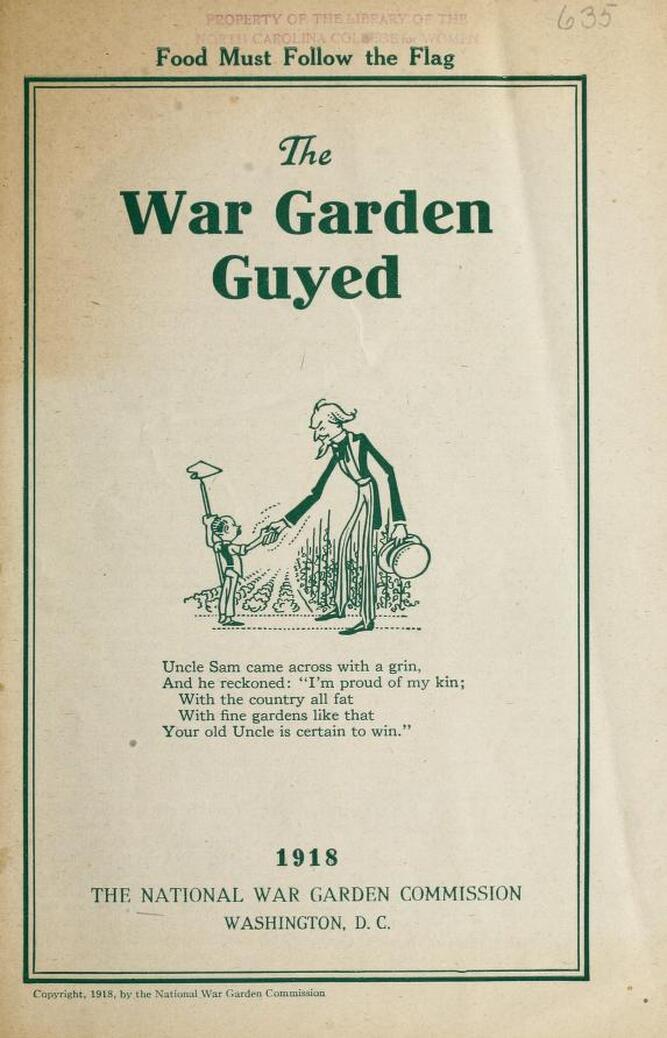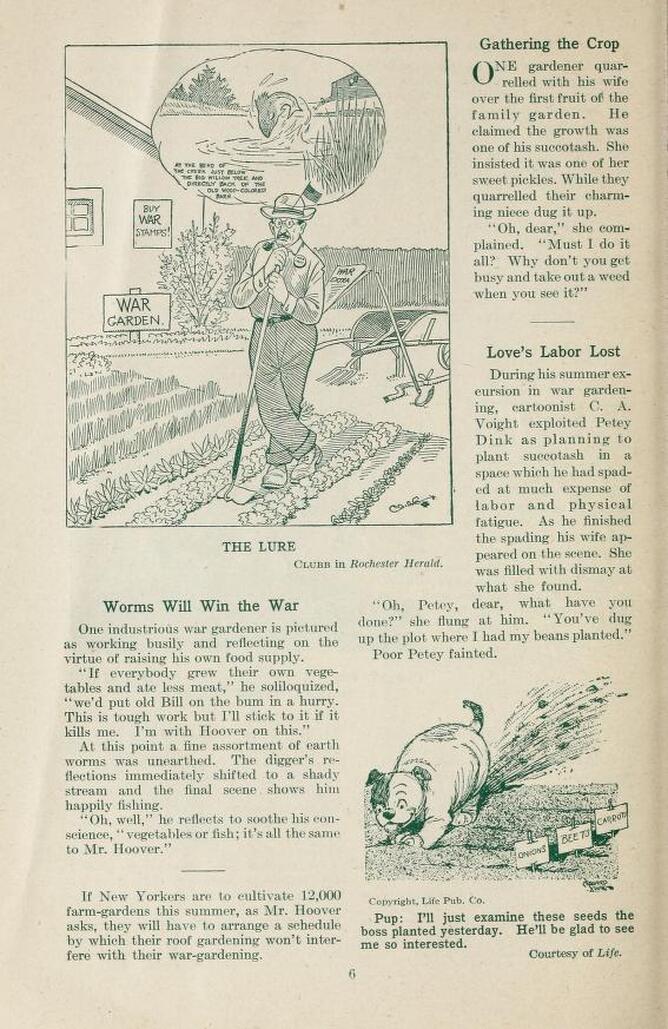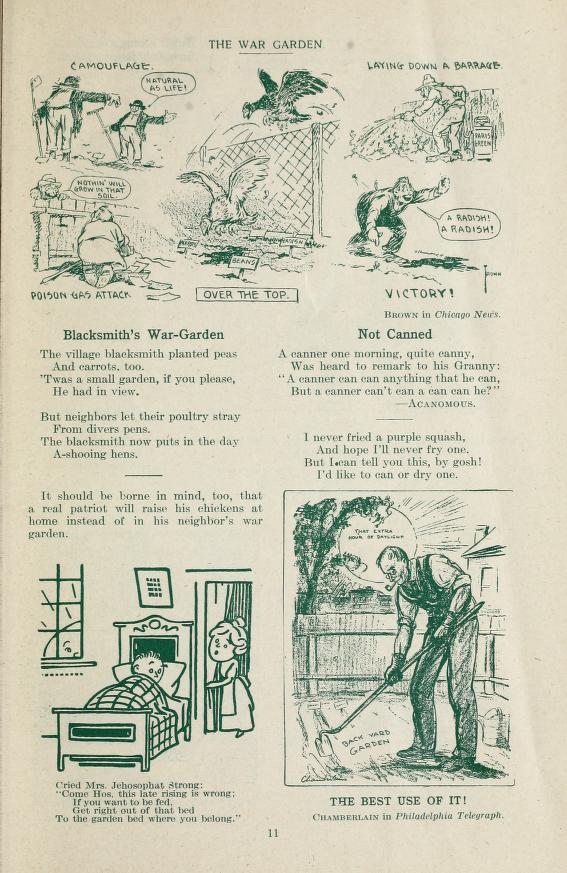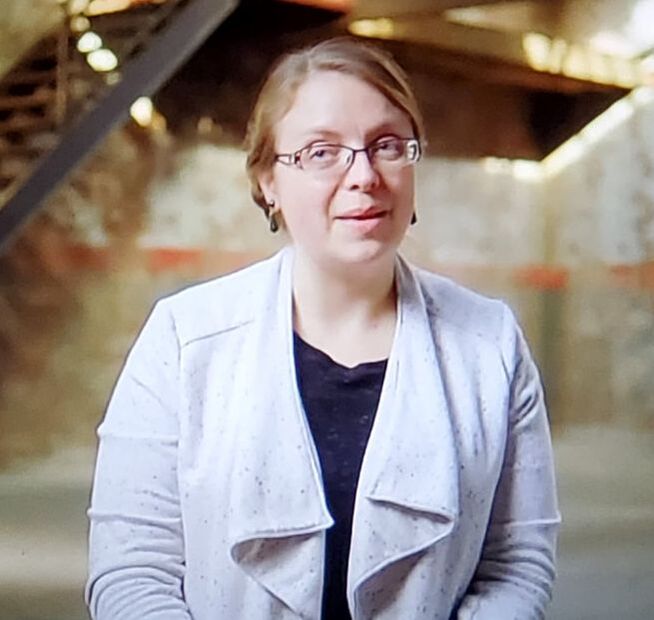|
Although literal tons of snow have fallen across the United States in the past week or so, it's still beginning to feel like spring, which for many of us means our thoughts turn to gardening. If you know anything about World War II, you've probably heard of Victory Gardens. But did you know they got their start in the First World War? And the popularity of "war gardens" as they were initially called, is largely thanks to a man named Charles Lathrop Pack. Pack was the heir to a forestry and lumber fortune, and pumped lots of his own money into creating the National War Garden Commission, which promoted war gardening across the country, along with food preservation. They published a number of propaganda posters and instructional pamphlets. Today's World War Wednesday feature is another pamphlet, but its primary audience was not the general public, but rather newspaper and magazine publishers! Full of snippets of poetry, jokes, cartoons, and articles published by newspapers and magazines around the country, even the title was a bit of a joke. "The War Garden Guyed" is a play on the words "guide" and the verb "guy" which means to make fun of, or ridicule. So "The War Garden Guyed" is both a manual to war gardens and also a way to make fun of them. In the introduction, the National War Garden Commission (likely Charles Lathrop Pack himself), writes: "This publication treats of the lighter side of the war garden movement and the canning and drying campaign. Fortunately a national sense of humor makes it possible for the cartoonist and the humorist to weave their gentle laughter into the fabric of food emergency. That they have winged their shafts at the war gardener and the home canner serves only to emphasize the vital value of these activities." Each page of the "guyed" has at least one image and a few bits of either prose or poetry. The below page is one of my favorites. In the upper cartoon, an older man leans on his hoe in a very orderly war garden. His house in the background features a large "War Garden" sign and a poster saying "Buy War Stamps!" In his pocket is a folded newspaper with the headline "War Extra." But he is dreaming of a lake with jumping fish and the caption - indicating the location of the best fishing spot. The cartoon is called "The Lure" and demonstrates how people ordinarily would have been spending their summers. In the lower right hand corner, a roly poly little dog digs frantically in fresh soil. Little signs read "Onions, Beets, Carrots." The caption says "Pup: I'll just examine these seeds the boss planted yesterday. He'll be glad to see me so interested." Another article on the page is titled "Love's Labor Lost." It reads: "During his summer excursion in war gardening, cartoonist C. A. Voight exploited Petey Dink as planning to plant succotash in a space which had had spaded at much expense of labor and physical fatigue. As he finished the spading his wife appeared on the scene. She was filled with dismay at what she found. 'Oh Petey, dear, what have you done?' she flung at him. 'You've dug up the plot where I had my beans planted.' Poor Petey fainted." Many of the bits of doggerel and cartoons poked fun at inexperienced gardeners like Petey Dink. Pests, animals, digging up backyards and hauling water, the difficulty in telling weeds from seedlings, and finally the joy at the first crop. This page has a comic at the top that illustrates these trials and tribulations perfectly, through the lens of war. In the upper left hand corner, a sketch entitled "Camouflage" depicts a man who has just finished putting up a scarecrow who crows, "Natural as life!" as he poses exactly the same as his creation. Below, another called "Poison Gas Attack" depicts a neighbor leaning over the fence to comment "Nothin will grow in that soil" at a man kneeling in the dirt, a bowl of seed packets and a hoe on either side of him. The title implies that the neighbor is full of hot air and poison. The center scene, titled "Over the Top," shows a pair of chickens gleefully flying over a fence to attack a plot marked "Carrots," "Beans," and "Radishes." In the top right-hand corner, in a sketch titled "Laying Down a Barrage," a man with a pump cannister labeled "Paris Green" is spraying his plants. Paris Green was an arsenical pesticide. And finally, in one labeled "Victory!" a man gleefully points to a small seedling in an otherwise empty row and cries, "A radish! A radish!" In a bit of verse called "Not Canned" reads: A canner one morning, quite canny, Was heard to remark to his Granny: "A canner can can anything that he can, But a canner can't can a can can he?" And finally, apt for this past weekend's Daylight Savings Time "spring forward" is an evocative sketch depicts a man hoeing up his back yard garden while a large sun shines brightly and reads "That extra hour of daylight." The sketch is captioned, "The best use of it!" "The War Garden Guyed" has 32 pages of verse, doggerel, short articles, and cartoons. Charles Lathrop Pack was correct when he said the newspapers evoked "gentle laughter" as none of the satirical sheets actually discourage gardening. Indeed, most of the text is directly in line with the propaganda of the day promoting the development of household war gardens and the movement to "put up" produce through home canning and drying. Many of the cartoons directly connect to the war itself, comparing fighting pests to fighting Huns, pesticides to ammunition and "trench gas," and equating canning and food preservation efforts with vanquishing generals. What the booklet does do is poke fun at all of the hardships and difficulties first-time or inexperience gardeners would face. Stray chickens, cabbage worms and potato beetles, dogs and children, competing spouses, naysaying neighbors, post-vacation forests of weeds, and trying desperately to impress coworkers and neighbors with first efforts. War gardens were no easy task, and there were plenty of people who felt that they were a waste of good seed. But Pack and the National War Garden Commission persisted. They believed that inspiring ordinary people to participate in gardening would not only increase the food supply, but also free up railroads for transporting war materiel instead of extra food, get white collar workers some exercise and sunshine, and provide fresh foods in a time of war emergency. How successful the gardens of first-year gardeners were is certainly debatable. But in many ways, war gardens were more about participating than food. After the war, Pack rebranded his "war gardens" as "victory gardens," asking people to continue planting them even in 1919. The idea struck such a chord that when the Second World War rolled around two decades after the first had ended, "victory gardens" and home canning again became a clarion call for ordinary people to participate in the war on the home front. The full "War Garden Guyed" has been digitized and is available online at archive.org. The Food Historian blog is supported by patrons on Patreon! Patrons help keep blog posts like this one free and available to the public. Join us for awesome members-only content like free digitized cookbooks from my personal collection, e-newsletter, and even snail mail from time to time! Don't like Patreon? Leave a tip!
0 Comments
Your comment will be posted after it is approved.
Leave a Reply. |
AuthorSarah Wassberg Johnson has an MA in Public History from the University at Albany and studies early 20th century food history. Archives
July 2024
Categories
All
|




 RSS Feed
RSS Feed